ASTANA – Kazakh Prime Minister Alikhan Smailov paid an official visit to Tehran on April 26, meeting with senior Iranian officials to enhance bilateral ties. Export contracts worth $60 million, bilateral documents in tourism, sport, youth work, customs training, and an agreement to develop transportation between the ports of Kuryk and Amirabad are among the key outcomes of Smailov’s visit, reported the government’s press service.

Smailov and Raisi shake hands during their meeting. Photo credit: primeminister.kz.
Smailov’s one-day visit included meetings with Iranian President Ebrahim Raisi and First Vice President Mohammad Mokhber with the aim to follow up on the implementation of the agreements reached between the presidents of the two countries.
During the meeting with Raisi, Smailov emphasized the importance Kazakhstan places on developing relations with Iran. The two sides discussed trade and economy, investment and cross-border cooperation, and the implementation of joint initiatives in the cultural and humanitarian spheres.
“Currently, the governments of the two countries are actively working on the practical implementation of the tasks set at the highest level. I am confident this year will be marked by new high results of our cooperation in bilateral and multilateral formats,” said Smailov.
The “new high results” are expected from the first meeting of the Kazakh-Iranian working group on agriculture planned in Tehran this year and the appointment of a special trade representative at the embassy of Kazakhstan in Iran.
Raisi described Kazakhstan as one of the most influential countries in the region.
“Although the significant growth of trade relations between the two countries last year has made the situation different from before, this level of relations is not commensurate with the capacities of the two countries, and we have to work hard to improve it,” said Raisi, as quoted by his press office.
Raisi also spoke about the investment in transit infrastructure from Central Asia to the Persian Gulf, transportation development to facilitate commercial cooperation, increasing cooperation in agriculture, and using innovative mechanisms in the monetary and banking fields.
Promising areas for trade
Development of trade and economic relations, deepening cooperation in agriculture, attracting investment, implementation of promising projects in the transit and transport sector, and increasing the volume of freight were on the agenda of Smailov’s meeting with Mokhber.

Mokhber and Smailov. Photo credit: primeminister.kz.
Iran is one of Kazakhstan’s key partners in the Persian Gulf, said Smailov. Last year, bilateral trade turnover between the countries grew by nearly 20 percent, reaching $528 million.
Smailov stressed that Kazakhstan is ready to increase exports of 75 commodity items worth approximately $250 million.
“I am confident that as our economic potential is fully unlocked, we can bring the mutual trade up to $3 billion. We have significant potential for this in areas including energy, transport and logistics, agriculture and industry,” said Smailov.
Agriculture offers substantial opportunities in achieving this goal, accounting for more than 70 percent of the mutual trade. To expand trade in agriculture, Smailov said Kazakhstan is ready to supply the Iranian market with flour, confectionery and pasta products, meat products, and vegetable oils. Kazakhstan is interested in vegetables and fruits from Iran, particularly during the off-season.
Connectivity and transport
The two countries can also leverage their strategic location and transport infrastructure to boost trade and commerce.

Mokhber and Smailov address a joint press conference. Photo credit: primeminister.kz.
Iran, strategically located at the crossroads of the Middle East, Central Asia, and the Caucasus, has an extensive transport network making it an ideal gateway for trade between Asia and Europe. The same can be said for Kazakhstan, a landlocked country with vast natural reserves and a key transit hub for goods flowing between China and Europe.
Both countries can tap into the development of the North-South transport corridor, a multi-modal transport network that connects the Indian Ocean and the Persian Gulf to the Caspian Sea via Iran and then onwards to Russia and Europe.
“The government of Kazakhstan aims to fully implement the tasks set by the heads of our states and bring the Kazakh-Iranian partnership to a qualitatively new level,” said Smailov.
Mokhber agreed with Smailov on the untapped potential in trade and said the two countries should stimulate the private sector.
“We invite Kazakh companies to take an active part in developing our partnership,” stated Mokhber.
Export contracts
Export contracts worth more than $60 million were signed as part of the third trade and economic mission in Tehran for supplies to Iran of Kazakhstan’s fertilizers, oil and fat products, and cattle meat.

Third trade and economic mission in Tehran on April 26. Photo credit: primeminister.kz.
The event, organized by the QazTrade Center for Development of Trade Policy, was attended by representatives of the Kazakh Ministry of Agriculture, the joint Chamber of Commerce, the Chamber of Commerce, Mining and Agriculture of Iran, 20 Kazakh companies in the food, chemical, construction, light industry, and metallurgy sectors, and more than 150 delegates from the Iranian side.
Iranian companies showed particular interest in Kazakh producers of phosphate fertilizers, ferroalloys, and food products.
